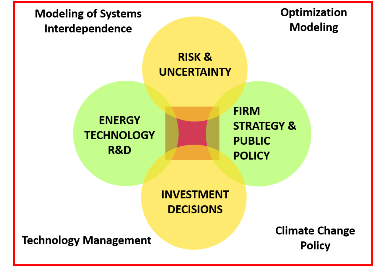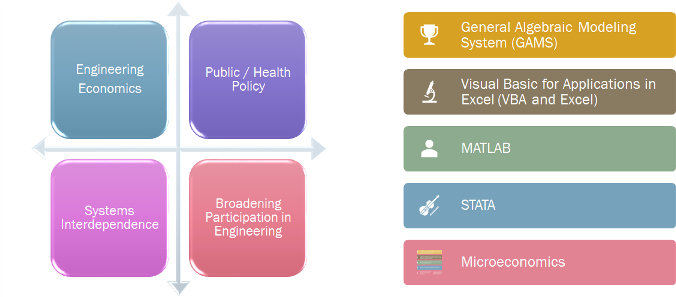The System Modeling Laboratory for Economic Decision (SysMoLED, pronounced /sismōl-d/) conducts reseeach at the interface of systems engineering and engineering management with emphasis on thematic areas including modeling of systems interdependence, mathematical programming and optimization, technology management, the economics of environmental change and technology policy. The figure below illustrates the nexus of these areas including the key topical decision making frameworks.

The scientic understanding of the interactions between different systems is evolving because of the increasing interdependency between the systems. Complicating the studies on these interdependent systems is the effect of uncertainties in the decision making process. For example, there is a rising impact of the changes in the global environmental system on the decisions made to combat either man-made or nature-induced catastrophes. There is
now a growing recognition that today's energy and environmental policy choices are also highly sensitive to uncertainties
associated with the actions of other decision-makers and technological learning. The inherent risk is exacerbated by the increasing interdependence between the systems.
We examine ways of integrating formal decision tools and microeconomics to develop technology policies that have a good chance of achieving their desired impact. For example, in the energy technology arena, a development that makes this a challenging problem is that the number of different policy instruments under active discussion has increased from a focus on cap-and-trade and carbon taxes to instruments such as feed-in taris or quotas for renewable energy, and investments in research and development. Our research agenda on this track is based on a risk management approach to developing intervention policies. For example, in the U.S. there are different state-level policies to promote more renewable energy generation, but there is a lack of coordination across state lines, markets, and regulatory/compliance regimes limiting the benefits that a concerted, and systemic, effort would have produced. Furthermore, in order to distill the influence of life cycle cost assessment on the deployment and adoption of cleaner energy production, we employ the tools of configuration management and optimization modeling to explore the operation of microgrids or distributed energy resources.
The Figure below highlights some of the themes that underline our research agenda. With domains ranging from engineering economic decision making, modeling of systems interdependence, public health and public health policy, to broadening participation of underrepresented minorities and females in science, technology, engineering and mathematics (STEM). While these themes are not exhaustive of our areas of focus, we routinely emply tools including General Algebraic Modeling System (GAMS), Visual Basic for Applications in Excel (VBA), MATLAB, STATA for econometric analysis, and microeconomic theory.

Closely related is the research stream on the factors in influencing strategic decisions in the energy industry. We investigate how the persistence of existing resource stocks and irreversible
investments can create strategic commitment that prevents a firm from making investments into
renewable energy, while, at the same time, institutional policy pushes firms toward new resource
investments and renewal of their capability portfolio. In a new and exciting oportunity, we also seek to develop a comprehensive framework that offers novel ways technology can improve decision-making for healthcare logistics under conditions of uncertainty and risk in developing
countries. Supply chains in developing countries are already strained due to peculiar features of delivery inhibitions including limited cold chain capacities, electric power infrastructure and effective procurement policy. Our objective is to incorporate several dimensions of uncertainties into the estimation of the delivery costs of vaccines and suggest optimal procurement strategies.
For more details, see research.
Project Director: 
Ekundayo Shittu
Assistant Professor
Department of Engineering Management & Systems Engineering,
The George Washington University.
Research Affiliate, Environmental and Energy Management Program, Solar Institute.
email: eshittu@gwu.edu;
phone: +1 202 994 3574 (office)